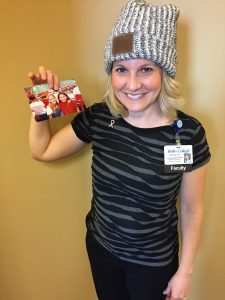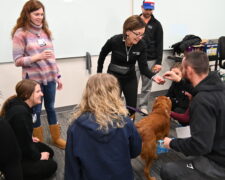Bellin College Cancer Story – Love Your Melon
 My mom’s battle with cancer made me the nurse I am today
My mom’s battle with cancer made me the nurse I am today
By: Malina Herber
Bellin College Faculty
My mom, Barb, was diagnosed with stage 3 breast cancer at the age of 49. She was previously healthy with no medical history and no risk factors for breast cancer (no alcohol or tobacco use, healthy diet, no personal or family history, children at a younger age, etc.). She felt a lump in her breast while performing a self-breast exam; she discovered this lump on September 11, 2001 (9/11). **While listening to my mom and watching the TV that day, I remember feeling as the world was about to end…I was very overwhelmed, terrified I might lose my mom to cancer…
After a biopsy, my fears were confirmed. The lump was found to be cancerous, invasive lobular carcinoma of the breast, a difficult cancer to treat. My mom underwent extensive chemotherapy to “shrink” the tumor. **I will never forget going to the hairdresser with my mom when she had lost so much hair that it was time to shave her head. I had to turn away so she couldn’t see me crying…I told her she “looked beautiful” no matter what, but my heart was breaking inside…
After the tumor had shrunk somewhat, there was surgery to remove the tumor (mastectomy) and surgery to remove multiple lymph nodes, as the cancer had metastasized to lymph nodes in the surrounding area. **I remember my mom coming home following the mastectomy; she had 4 JP drains coming out of her torso and was absolutely devastated with her appearance. She showed me her incision and looked completely disfigured; she cried on my shoulder that night.
Following surgery, my mom underwent additional chemotherapy treatments followed by numerous radiation sessions. Her left arm swelled from severe lymphedema and the radiation burned her skin in several areas; her skin was so sensitive that any type of clothing she wore would cause her pain. She could hardly move at all without tearing up and had to wear a compression sleeve at all times to treat the lymphedema.
Thankfully, a year and a half following my mom’s initial diagnosis she was told she was finally cancer-free, we hoped for good. **I thought she had fought the “cancer-battle” and won…we were cautiously optimistic.
Life went on, but cancer is something you never really stop thinking about…even with a positive prognosis. My mom continued to have CT scans and lab work every 3 months. Her hair grew back and she regained some of her strength, though she was still extremely weak and fatigued. After a year had passed, she was told she could have CT scans and lab work every 6 months as opposed to every 3 months…a positive sign, in everyone’s eyes. We again thought she had turned the corner.
It was during this time when my mom developed severe ascites in her abdomen. She went back to her physician before her 6 month check and a CT scan revealed cancer in her liver. We were devastated. My mom started chemotherapy again, and along with it, lost her hair again. This time, the chemo was much stronger, and the side effects hit her hard. She had mouth sores, nausea, vomiting, and constipation, not to mention the ongoing ascites. She developed such severe neuropathy from the chemo that she could hardly walk, she was so unsteady and in so much pain. She could barely use her hands to write. She needed help with transfers, and she began sleeping upright because she couldn’t breathe well, secondary to ascites (her ascites was so severe, she looked like she was nine months pregnant). Multiple times, she went in to have her abdomen “tapped” (abdominal paracentesis)…I couldn’t believe the amount of fluid that came out…once they removed 4 liters! **I could barely stand to be around my mom because I couldn’t bear seeing her in the condition she was in. I had never felt so helpless!
The chemo continued on a weekly basis, as well as the ongoing side effects. At times, my mom’s white blood cell count was so low she could not receive the chemo, which was both a blessing and a curse. She needed the chemo to live, though her quality of life was intolerable.
After another year, my mom’s CT scans revealed that the chemo was ineffective. The cancer had spread to involve her pelvis, spine, scapula, and other bones throughout her body. The cancer in the liver had shrunk, but the liver was so damaged from the chemo that she was advised to stop the chemotherapy treatments; at this point it was the chemo, not the cancer, that had ruined her liver, and there was nothing more that we could do. She was going to die from this.
Following this prognosis, my mom was admitted to the hospital, and eventually transferred to a hospice unit, where she spent the last month of her life. Keeping her comfortable and assisting with her basic needs became the focus of care. **I couldn’t handle this because I had been working in an ICU where I was constantly saving lives, not allowing patients to die…how could I allow this?! We wanted to take her home but she was just too weak, and we needed too much help. My dad and 3 brothers and I spent every minute with my mom while she was in the hospital, and although this time was precious to me, it was also torturous, as I couldn’t stand to see my mother deteriorate. Every day she was a little bit worse. She gradually stopped eating, her liver failed and her other body organs followed suit. Eventually, she became unresponsive and she slipped into a coma-like state. She was a fighter, but she was forced to give up. It was the worst time of my life.
On May 31, 2005, my mother died at the young age of 54. She left behind her parents (my grandparents), her husband (my dad), myself, and my 3 younger brothers, including my youngest brother Mike, who graduated from high school a week after she passed. He spoke of her during his speech as class president at the Minneapolis Target Center; his class wore cancer ribbons in her honor. My mom also left behind my aunts and uncles, nieces, and an abundance of friends. She was the mom who “had all the kids over all the time;” she was a parent to me as well as several of my friends. I’ll never forget my elderly grandparents (her parents) looking over her casket. I could read the look on my grandma’s face, and I knew she was asking God, “Why did this happen to my child, before me? It wasn’t her time.” The church was completely packed on the day of my mom’s funeral…she was loved by so many. God acquired a new angel that day.
I never fully understood the impact of cancer until I lived through it with my mother, and I want others to know what a life-changing experience it is, regardless of whether or not the outcome is positive or negative. It takes over your life. It changed me as both a person and nurse. I watched my mom suffer and I can tell you firsthand that there is nothing more unbearable than watching someone you love, especially your mother, deteriorate and suffer right in front of your eyes. I would have done anything for my mom, and yet, I felt completely helpless. I cried every day for her. In the beginning, I prayed constantly for a cure, asking God to make an exception, to save her and let her live. Towards the end, I shifted my prayers, asking for the opposite. If there couldn’t be a cure and death was inevitable, I prayed that it would happen soon, because I simply couldn’t bear the thought of her suffering any more. I just wanted it to be over.
I was completely consumed with my mom at the time, but while in the hospital, I couldn’t help but notice that my family wasn’t the only family going through this tragedy. Families all around us were experiencing the same thing, other patients were suffering just as much as my mother, and this really struck me. For one, it strengthened my commitment to my chosen career of nursing. I always wanted to help others, but after this experience, even more so. To this day, I do my best to ensure my patients are not in pain. I take pleasure in the “little things” like washing someone’s hair or holding their hand. All these things make a difference, no matter how small or insignificant they may seem. I knew that I, personally, could never work in hospice nor oncology, but I gained a whole new respect for nurses that do…their strength and compassion truly amazed me, and I told this to their supervisors after my mom passed. They deserved more recognition that I could possibly provide. The nurses were with my mom, and my family, during the most personal and intimate of moments. Is there anything more powerful? To be with a patient, and patient’s families, during end-of-life is truly a privilege, a gift from God. The impact the nurses made on me and my family during this experience was nothing short of incredible. As nurses, we are so fortunate to be in the position we are in, to have this ability to make a difference for our patients.
The other lesson I took away from this experience is to never take anything for granted, whether it be your health or your relationships. To have your health, to be able to walk, to talk, to use your hands, to be pain-free, is something we all take for granted, whether we admit it or not. When you have a chronic health problem, it really does take over your life. It becomes the focus of everything you do, affects your relationships, your job, your hobbies, your mobility, and your plans for the future. That being said, if you have your health, you must take care of it, maintain it, and be grateful every day for it, because it can change at the drop of a hat. Control what you can and appreciate what you have; health, like life, can be more fragile than you realize.
Along those same lines, do your best to appreciate those you love, and those who love you. Find joy in spending time with others. Set your priorities straight. Everyone is busy; we all have things to do and places to go, but at the end of the day, what matters most, where we make the biggest impact, lies within the type of person we are and how we treat others…especially those we are (or should be) closest to. All too often, we take those we love for granted; we are rude, or disrespectful, or generally ungrateful for their presence…we don’t take the time to think about (really think about!) how life might be without them. **If I could go back, I would be nicer to my mom. I would tell her every day (not just when she was ill) how much I loved her, appreciated her, and aspired to be like her. I would do the things she’d like to do without complaining about it, and I would go out of my way to be with her, regardless of my busy schedule. I know my mom loved me and I know that she knew I loved her, but I could have done better, I could have done more. I pray she understood how much I loved her.
My mom is gone, and although I feel her with me on a day-to-day basis, I’ll never get the chance to watch her hug and kiss her grandchildren, at least not in this lifetime. I can’t do anything to change the past, but what I can do is give back, and help those in the same situation. This is another lesson I’ve learned. As I said before, I may not be able to work in hospice or oncology, but I can certainly give back in other ways. For example, my family and I have walked in the “Race for the Cure” since my mom’s initial cancer diagnosis. The “Race for the Cure” is an enormous event put on by the Susan G. Komen foundation in Minneapolis, MN each year. This event has raised millions of dollars for breast cancer research and continues to do so on an annual basis. Fittingly, this event normally takes place on Mother’s Day. I additionally participate in various walks/runs that raise money for breast cancer, and I contribute to the Breast Cancer Association and various other foundations/fundraisers collecting monies for breast cancer. “Love Your Melon,” similarly, is another organization that appeals to me, as an opportunity to give back to those in need.
Outside of monetary contributions, and on a much smaller scale, it is important to “give back” through your actions as well as your words to patients, family and friends. By being kind, caring, and compassionate, by giving your full attention to a patient, family, or friends, you can “give back” by giving yourself, “being there” in the moment, and by doing your best to make patients, family and friends more comfortable. As I said before, the biggest impact we make lies within the type of person we choose to be and how we treat others…so choose to be a good person, a fantastic nurse, and treat others how you would like to be treated. Make your difference by cherishing your relationships with patients, family, and friends, and do your best to put yourself in your patient’s shoes…ask yourself what you would want if you were the patient, in the patient’s situation? By attempting to embrace these actions, I feel as though I might be able to make my mom proud, for she was the kindest, most caring, compassionate, and thoughtful and loving person I have ever met. She is still working through me, and although I’ll never understand why she had to get cancer nor leave this world so soon, I thank God every day for the opportunity to have been her daughter, and to have had a role-model like her in my life. Living through the cancer journey with my mom was horrendous, to say the least, but in the end, I was inspired to be both a better person and a better nurse as a result of it…and I’m forever grateful for that. Similarly, I hope other individuals who have lived through this process with someone they love may be inspired the same way.
Thanks for hearing my story…I’ll love you forever, Mom!
Love Your Melon is an apparel brand run by college students across the country on a mission to give a hat to every child battling cancer in America. Bellin College started a Love Your Melon Chapter on Campus, Spring 2016.


